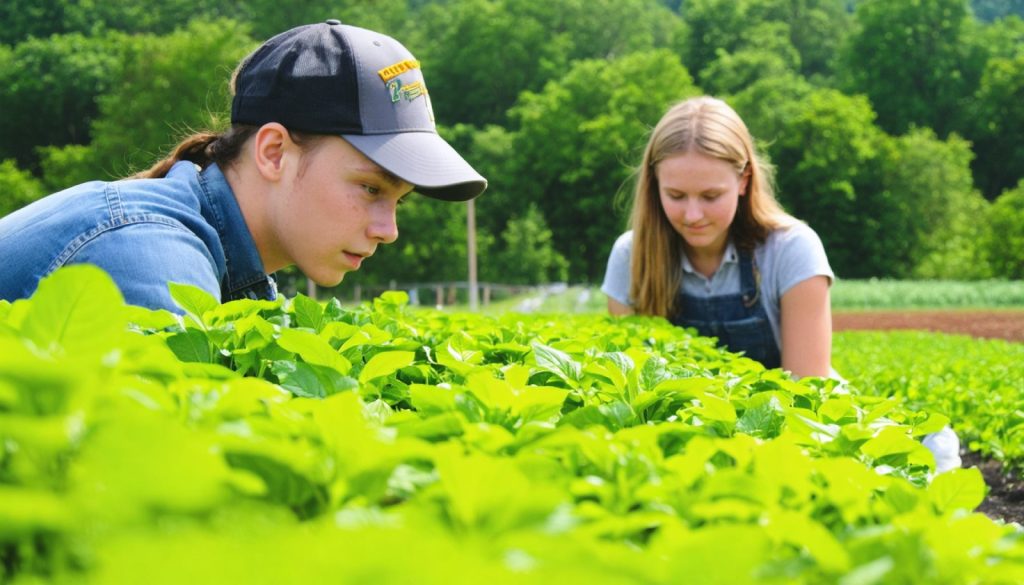
- Five teams of Arkansas Tech University agriculture students presented innovative business plans at the Growing AgBiz Ideas symposium in Russellville, Arkansas.
- Under Dr. Syed Meerza’s mentorship, these students crafted detailed blueprints outlining start-up costs, marketing strategies, and sales projections.
- Distinguished panelists, including industry experts, provided critical feedback and mentorship, enhancing the students’ plans and sparking new ideas.
- Highlighted projects include “479 Cattle Auction,” “Cattlecopter,” “EcoShroom,” “Wild Game Grove Hunting Lodge,” and “BioTwine,” each offering groundbreaking solutions to agricultural challenges.
- The symposium emphasized the combination of academic skill and practical mentorship as essential to transforming innovative concepts into viable business ventures.
- This initiative underscores the importance of entrepreneurship in advancing the future of agriculture and marks a potential transformation for the industry.
- The students aim to submit their refined proposals by spring 2025, signifying a promising step toward revolutionizing agriculture.
In the heart of Russellville, Arkansas, something remarkable is taking root. As the sun cast its golden hue over the Co-Create Innovation Hub, the air buzzed with excitement and opportunity at the Growing AgBiz Ideas symposium. Here, five ambitious teams of Arkansas Tech University agriculture students unveiled innovative business plans that could redefine the future of agriculture in bold, visionary strides.
Under the watchful guidance of Dr. Syed Meerza, an assistant professor of agriculture business with a knack for mentoring, these senior students embarked on a rigorous journey of crafting their dreams into tangible business strategies. These plans were not just academic exercises; they were comprehensive blueprints packed with intricate details about start-up costs, logistical nuances, marketing strategies, competitive landscapes, and sales projections. Dr. Meerza ensured that each student emerged with a document that embodies professional finesse, ready to pitch to potential investors.
The symposium was not just a platform for presentations but a crucible where ideas were tested and refined under the discerning gaze of distinguished panelists. Industry experts such as Nicole Bartlett, Josh Edgin, Charlie Metz, Jeff Small, and Jared Wood lent their ears and wisdom, providing vital feedback that challenged the students to elevate their concepts. The panelists’ keen insights acted as catalysts, sparking new ideas and innovations as students absorbed their critiques.
Take, for example, the inventive minds behind “479 Cattle Auction” or the high-flying visionaries of “Cattlecopter,” whose technology-driven approach to cattle management could revolutionize efficiency and oversight in agriculture. Meanwhile, the team behind “EcoShroom” is turning heads with a proposal to cultivate sustainable mushrooms, an effort that seamlessly blends ecology and economy. Their peers at the “Wild Game Grove Hunting Lodge” are crafting an experience rich with both wildlife interaction and economic promise, while “BioTwine” promises an eco-friendly solution to agricultural waste using biodegradable materials.
But the true strength of this venture lies not just in the ingenuity of the ideas but in the symbiotic relationship between academic prowess and real-world mentorship. As an extension of the Co-Create Innovation Hub’s support, students seized the opportunity for mentorship and networking, unlocking the resources needed to turn dreams into profitable ventures.
As the day closed with a hopeful group photo, a sense of unity and purpose pervaded. These young entrepreneurs, armed with knowledge and bolstered by expert guidance, are on the path to becoming the faces of a new generation of agriculture leaders.
This symposium is more than just an academic endeavour; it’s a seedbed for future innovation. The students’ drive exemplifies a spirit of entrepreneurialism that is vital for the evolution of agriculture. Those involved have planted the seeds of transformation not just for themselves, but potentially for an industry on the cusp of change.
Arkansas Tech’s agriculture pioneers remind us that the future belongs to those who dare to innovate, collaborate, and cultivate growth—not only in crops and livestock but in ideas and partnerships as well. This is just the beginning, as the students prepare to submit their polished plans by the spring of 2025. With resilience and vision, they might just be the ones to rewrite the future of agriculture.
Unlocking Agriculture’s Future: How Arkansas Tech Students are Pioneering Innovation
In the heart of Russellville, Arkansas, a movement is quietly reshaping the landscape of agriculture. The Growing AgBiz Ideas symposium at the Co-Create Innovation Hub was a crucible of innovation, where five bold teams from Arkansas Tech University unveiled groundbreaking business plans poised to transform the agricultural industry. But what are the further implications and opportunities arising from this initiative? Let’s delve deeper.
How These Business Plans Are More Than Academic Exercises
The business plans presented are comprehensive, functioning as more than theoretical exercises. They serve as actionable blueprints with the potential to attract investors. Each plan encompasses detailed projections on startup costs, logistics, marketing strategies, competitive analyses, and anticipated sales.
Real-World Implications:
– Investment Attraction: The details provided in these plans make them ripe for attracting real investors beyond the academic purview.
– Entrepreneurship Training: Students gain practical experience in entrepreneurship, preparing them for real-world challenges.
– Industry Innovation: These plans reflect the cutting-edge of agricultural innovations, such as technology-infused solutions and sustainable practices.
The Importance of Mentorship and Guidance
Under the expert mentorship of Dr. Syed Meerza, the students not only crafted their ideas but refined them into pitch-worthy projects. The involvement of industry experts such as Nicole Bartlett and Jared Wood provided the students with invaluable insights.
Key Benefits of Mentorship:
– Enhanced Skill Sets: Students honed soft and hard skills crucial for business, such as communication, negotiation, and critical thinking.
– Networking Opportunities: Interactions with industry leaders open doors to future collaborations.
– Continuous Feedback: Constructive critiques help refine strategies and bolster student confidence.
Spotlight on Innovative Projects
Among the innovative ventures were:
– “479 Cattle Auction” and “Cattlecopter”: These projects are leveraging technology to enhance cattle management efficiency.
– “EcoShroom”: Focuses on sustainable agriculture by cultivating environmental-friendly mushrooms.
– “Wild Game Grove Hunting Lodge”: Aims to blend wildlife interaction with economic viability.
– “BioTwine”: Innovatively tackles agricultural waste with biodegradable materials.
Pros and Cons Overview:
Pros:
– Integration of technology and sustainability.
– Diverse range of projects addressing different agricultural needs.
– Potential for significant industry impact.
Cons:
– Market adoption could be slow for new technologies.
– Initial funding requirements may be high.
– Regulatory challenges could arise.
Market Trends and Predictions
The agricultural innovation landscape is rapidly evolving, with trends leaning towards sustainable solutions and technology integration. According to a report by MarketsandMarkets, the smart agriculture market is projected to reach $23.14 billion by 2025, highlighting a surge in technological adoption.
Insights & Predictions:
– Increased AI and IoT Use: Expect higher integration of AI and IoT in crop and livestock management.
– Focus on Sustainability: Eco-friendly solutions like “BioTwine” will see rising demand.
– Experience-Based Ventures: Concepts like “Wild Game Grove” align with the growing interest in agritourism.
Actionable Recommendations for Readers
– Stay Informed: Regularly update yourself on technological advancements in agriculture.
– Invest in Mentorship: Seek mentors who can provide industry insights and guidance.
– Embrace Innovation: Consider integrating sustainable and technological practices into your own ventures.
Conclusion
The future of agriculture is being molded by young minds ready to innovate and adapt. The students of Arkansas Tech University exemplify the spirit of entrepreneurship, driving forward a more sustainable and efficient agricultural industry. As they prepare to submit their polished plans by spring 2025, they are laying the foundation for a future where innovation leads to growth and sustainability.
For more information about events and innovations similar to the Growing AgBiz Ideas symposium, check out the Arkansas Tech University website.



